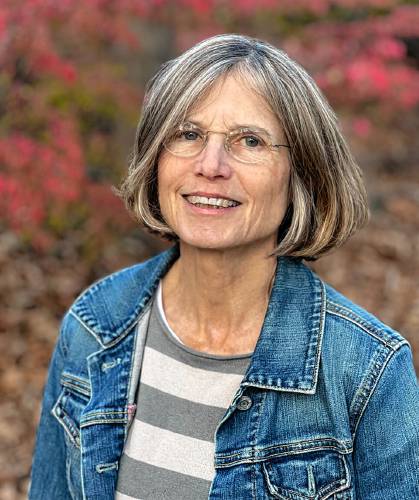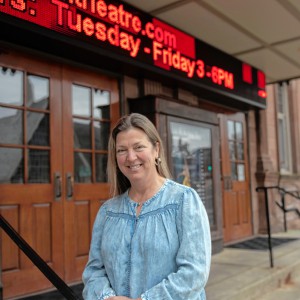Get Growing with Mickey Rathbun: Become an educated gardener: Three upcoming symposia will answer all your gardening questions
| Published: 03-14-2024 3:07 PM |
Most of us humans assume that other creatures experience the world through their senses of sound, taste, smell and touch, the same way we do. But we couldn’t be more wrong, as science writer Ed Yong explains in his fascinating new book, “An Immense World.” Yong came to Amherst College’s Lit Fest last week and spoke about his mind-expanding work, an exploration of the senses of animate beings that go far beyond those we humans enjoy or can even imagine.
Yong uses the German word “umvelt” to describe the specific sensory environment experienced by a particular creature. Birds feel magnetic fields that enable them to navigate their long migrations and see ultraviolet colors that are invisible to the human eye. Butterflies and other insects taste with their feet. Bats, owls and insects hear sounds at high frequencies way beyond the detection of our hearing.
I devoured Yong’s book. I think his discussion of the enormous array of the sensory capabilities of birds and insects should have a particular resonance for gardeners and anyone concerned about preserving the natural environment, the umvelt in which these other beings live.
As we prepare to get out into our gardens, it’s important to consider not only how we sense them, but how they are experienced by the birds and insects who inhabit them. Are we planting shrubs and trees in places where birds can nest and shelter? Are we planting native plants that provide food for local fauna? Are we providing a beneficial habitat for pollinators? The three spring symposia produced by the Western Massachusetts Master Gardeners Association (WMMGA) will answer these questions and a whole lot more. The WMMGA is devoted to educating people about improving the living conditions for even the tiniest creatures that make up our horticultural habitats. Each symposium includes talks that address various aspects of environmentally sensitive gardening.
The first symposium, “Let’s Get Growing!” (they must read my column!), will take place on Saturday, March 23 from 8 a.m. to noon at the South Middle School in Westfield. Dan Ziomek of Sugarloaf Gardens, who is also an avid and experienced birder, will present “Planting for Birds in Your Backyard.” Kristen Nicholson of Blue Stem Natives Nursery will talk about “Garden for Life: Using Native Plants in the Landscape.” Dr. Olga Kostromytska, an entomologist from University of Massachusetts Extension & Stockbridge School of Agriculture, will discuss the thorny topic of garden insects, beneficial and otherwise. In her talk, “Friend or Foe? Helpful and Harmful Garden Insects and Worms,” she will explain how to spot invasive insects including the dreaded jumping worms that many of us are finding in our gardens.
The second WMMGA symposium, “Spring Into Gardening,” will be held in Lenox on Saturday, April 6 from 9 a.m. to noon at the Lenox Memorial Middle & High School. Christine Ferrero, a Cornell University master gardener, will talk about replacing invasive plants, which provide little to no sustenance to local fauna, with natives to restore a healthy habitat for wildlife. She will discuss the plants listed on the official Massachusetts invasives list (like Asiatic bittersweet, winged euonymus and garlic mustard, all common to our area) and discuss native alternatives. In another environmentally tuned presentation, “Compost Happens,” WMMGA’s Jodi Cahillane will give a how-to, hands-on class on composting. As someone relatively new to composting, I can attest that it’s a rewarding endeavor that requires very little work while giving me the pleasure of making my own dirt.
The final symposium, “Gardening in Changing Times!,” will take place closer to home (for most of us) at Frontier Regional High School in South Deerfield on Saturday, April 13 from 8:45 a.m. to noon. Dan Ziomek will talk about creating inviting habitats for birds by providing food as well as places to nest and shelter from predators. He will discuss native plant materials and how to place them properly to attract the widest variety of bird species. WMMGA’s Heidi Dollard will talk about ways to manage and reduce lawns. She will explain how better and smaller lawns support important insect species and also reduce CO2 emissions from lawn mowers. Heidi will also give a talk titled “Transform Your Yard to Support Pollinators: A 12‐Step Program,” that will discuss how to make yards and gardens pollinator friendly, outlining a step-by-step process of evaluation, planning and implementation. Finally, Kay Cafasso of The Permaculture Place in Shelburne Falls will explain how to grow an ecosystem for food, habitat, medicine and beauty in your yard, based on permaculture principles that originate from observation of the natural world.
I highly recommend these WMMGAsymposia. They are well-planned, fun and informative and provide a wonderful opportunity to connect with old friends and meet new ones. And, for anyone interesting in understanding more about how insects and birds experience the umvelten that we seek to enhance for their benefit, pick up a copy of Ed Yong’s book. It’s a page turner. I promise.
Article continues after...
Yesterday's Most Read Articles
 ‘Home away from home’: North Amherst Library officially dedicated, as anonymous donor of $1.7M revealed
‘Home away from home’: North Amherst Library officially dedicated, as anonymous donor of $1.7M revealed
 Super defers Amherst middle school principal pick to successor; one finalist says decision is retaliation for lawsuit
Super defers Amherst middle school principal pick to successor; one finalist says decision is retaliation for lawsuit
 Granby Bow and Gun Club says stray bullets that hit homes in Belchertown did not come from its range
Granby Bow and Gun Club says stray bullets that hit homes in Belchertown did not come from its range
 Connecticut man gets 8 years in Hadley shooting
Connecticut man gets 8 years in Hadley shooting
 Design Review Board in Amherst backs 5-story apartment project connected to old Hastings building
Design Review Board in Amherst backs 5-story apartment project connected to old Hastings building
 Political newcomer defeats Shores Ness for Deerfield Selectboard seat
Political newcomer defeats Shores Ness for Deerfield Selectboard seat
For more information about the WMMGAsymposia and to register, go to:https://wmmga.org
Mickey Rathbun is an Amherst-based writer whose new book, “The Real Gatsby: George Gordon Moore, A Granddaughter’s Memoir,” has recently been published by White River Press.



 A DIY approach to flying: Local pilots build and help build their own aircraft
A DIY approach to flying: Local pilots build and help build their own aircraft You’re up next: Western Mass open mic scene heats up post-pandemic
You’re up next: Western Mass open mic scene heats up post-pandemic One upon a story slam: This year’s Valley Voices winners head to a final competition
One upon a story slam: This year’s Valley Voices winners head to a final competition Preserving a key part of Emily Dickinson’s legacy: Historic Evergreens house reopens at the Emily Dickinson Museum
Preserving a key part of Emily Dickinson’s legacy: Historic Evergreens house reopens at the Emily Dickinson Museum